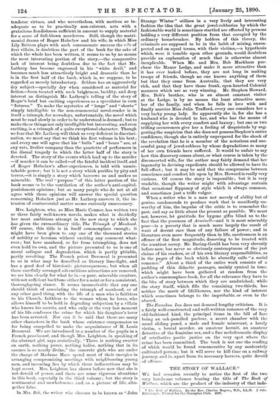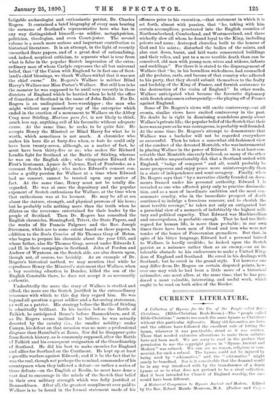THE STORY OF WALLACE.*
WE had occasion recently to notice the first of the two very handsome volumes bearing the title of The Book of Wallace. which are the product of the industry of that hide- * The B9ok of Wallace. By the Rev. Charles Rogers, D.D., LL.D. 2 vols.
fatigable archieologist and enthusiastic patriot, Dr. Charles Rogers. It contained a brief biography of every man bearing the surname of Scotland's representative hero who has in any way distinguished himself,—as soldier, metaphysician, politician, theologian, and even Court-jester. The second volume is a much more serious and important contribution to historical literature. It is an attempt, in the light of recently unearthed State papers, and of a great deal of rationalising, and, indeed, sceptical criticism, to separate what is true from a-hat is false in the popular Scotch impression of the extra- ordinary man of whom Carlyle expresses the all but universal belief, that" if the Union with England be in fact one of Scot- land's chief blessings, we thank Wallace withal that it was not the chief curse." Dr. Rogers's Wallace is neither Blind Harry's Wallace nor Miss Porter's Wallace. But still less is he the monster he was supposed to be until very recently in those districts of England which he harried when he held the office of Guardian of Scotland in the name of John Baliol. For Dr. Rogers is an undisguised hero-worshipper ; the man who might without any immodesty say of the enterprise which ended in the erection of a monument to Wallace on the Abbey Crag near Stirling, Maxima pars .fui, is not likely to think, much less say, anything evil of his favourite without adequate cause. At the same time, he seeks to be quite fair. He accepts Henry the Minstrel or Blind Harry for what he is worth, which sometimes is not much. A chronicler who makes his hero die at forty-five when, se teak he could only have been twenty-seven, although, as a matter of fact, he must have been thirty-five or so ; who makes Sir Richard Lundin fight for Scotland at the Battle of Stirling, whereas he was on the English side ; who vituperates Edward the First's lieutenant, Aymer de Valence, Earl of Pembroke, as a recreant Scotch knight ; who makes Edward's consort con- ceive a guilty passion for Wallace at a time when Edward had no consort, cannot be trusted upon any matter of fact. At the same time, Henry must not be totally dis- regarded. He was at once the depositary and the popular exponent of Scotch enthusiasm for Wallace, at the time when that enthusiasm was at its keenest. He may be all at sea about the stature, strength, and physical prowess of his hero ; but he probably tells nothing more than the truth when he ciliates on the reverence entertained for their leader by the people of Scotland. Then Dr. Rogers has consulted the English chronicles, Hemingford, Trivet, the State Papers, and the works of Sir Francis Palgrave and the Rev. Joseph Stevenson, which are to some extent based on these papers, in -addition to the Scala Gronica of Sir Thomas Gray of Heton, who began to prepare his chronicle about the year 1355, and whose father, also Sir Thomas Gray, served under Edwards I. and II. in their campaigns in Scotland. John of Fordun and Andrew of Wyntoun, on the Scotch side, are also drawn upon, though not, of course, too lavishly. As an example of Dr. Rogers's historical method, we may mention that while he reproduces Henry the Minstrel's statement that Wallace, when a boy receiving eduction in Dundee, killed the son of the English Constable there, he does not accept it as necessarily authentic.
Undoubtedly the more the story of Wallace is studied and sifted, the more are the Scotch justified in the extraordinary reverence with which to this day they regard him. He was beyond all question a great soldier and a far-seeing statesman, as well as a patriot. His strategy before the Battle of Stirling is admittedly brilliant. In his tactics before the Battle of Falkirk, he anticipated Bruce's before Bannockburn, and if, as Dr. Rogers seems inclined to believe, he was actually deserted by the cavalry (i.e., the smaller nobility) under Comyn, his defeat on that occasion was no more a professional disgrace than Hannibal's at Zama. Nor did he disappear quite from Scotch history, as is commonly supposed, after the Battle c f Falkirk and his consequent resignation of the Guardianship of Scotland. He did his best to make enemies for England and allies for Scotland on the Continent. He kept up at least a guerilla warfare against Edward; and if it be the fact that he was the real, though not perhaps the nominal, commander of his countrymen when they inflicted a defeat—or rather a series of three defeats—on the English at Roslin, he must have done a vast deal to encourage in the minds of the Scotch that belief in their own military strength which was fully justified at Bannockburn. After all, the greatest compliment ever paid to Wallace is to be found in the formal, statement made of his offences prior to his execution,—that statement in which it is set forth, almost with passion, that "he, taking with him certain accomplices, penetrated into the English counties of Northumberland, Cumberland, and Westmoreland, and there wickedly slew all whom he found loyal to the King, including priests and nuns ; destroyed churches built to the honour of God and his saints ; disturbed the bodies of the saints, and also cast down, burnt, and laid waste consecrated buildings and their relics, and put to a more terrible death than can be conceived, old men with young men, wives and widows, infants and sucklings." For there it is stated to the disparagement of Wallace that "he, in his boundless wickedness, had counselled all the prelates, earls, and barons of that country who adhered to his party, that they should submit themselves to the fealty and lordship of the King of France, and furnish assistance to the destruction of the realm of England." In other words, Wallace anticipated what became the favourite diplomacy with Scotch statesmen subsequently,—the playing off of France against England.
Some of Dr. Rogers's views will excite controversy,—at all events, similar views have excited controversy in the past. No doubt he is right in dismissing scandalous gossip about Wallace's private life; the popular belief of the Scotch that their hero was as pure as he was courageous, is probably well founded. At the same time, Dr. Rogers's attempt to demonstrate that Wallace was a bachelor will not be regarded everywhere as successful. Then he takes a somewhat old-fashioned view of the conduct of the detested Monteith, who was instrumental in placing Wallace in the power of Edward. It is at least con- ceivable that Monteith sincerely believed, as many of the other Scotch nobles unquestionably did, that a Scotland united with England, "badge of conquest" and all, would probably be more prosperous and enjoy peace more uninterruptedly than in a state of independence and semi-savagery. Finally, when Dr. Rogers says that "by a narrative chiefly founded on docu- ments framed under his personal authority, Edward I. is revealed as one who affected piety only to practise dissimula- tion, and as a man of inordinate ambition and the most con- summate cruelty, who in the immediate prospect of death continued to indulge a ferocious rancour, and to cherish the most terrible revenge," he takes not only an antiquated but a parochial view of a monarch of indubitably the highest mili- tary and political capacity. That Edward was Machiavellian and unscrupulous, is probable enough. That he had too little regard for human life, is more than probable ; in our own times there have been men of blood and iron who were not tender of the bones of Pomeranian grenadiers. But that, in spite of his bitter language, Edward had a personal hatred to Wallace, is hardly credible ; he looked upon the Scotch patriot as a nuisance rather than as an enemy,—as an in- tolerable obstacle to his endeavours to make a United King- dom of England and Scotland. He erred in his dealings with Scotland ; but he erred in the grand style. Yet however one may differ from Dr. Rogers on certain disputed points, how- ever one may wish he had been a little more of a historical rationalist, one must allow, at the same time, that he has pro- duced a most valuable, interesting, and useful work, which ought to be read on both sides of the Border.



















































 Previous page
Previous page